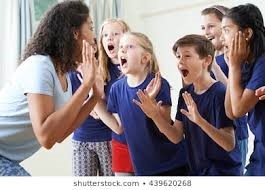Montessori and Drama in Education
Preparation:
The course provider will send to the participants a list of materials related to the course topic that they can read in order to prepare for the course. The course provider keeps in touch with the participants and tailors the course according to their specific needs. The course provider offers support if the participants need any information related to accommodation, plane tickets or other details necessary in organising the course.
Course description
The 21st century teacher is facing various pedagogical approaches that can be challenging to apply in the traditional classroom. This course focuses on trying and using teaching techniques from drama and Montessori in order to broaden one’s teaching range of techniques.
Montessori, developed by Italian doctor and educator Maria Montessori. She made an extensive research on holistic child's development, and the results were amazing. Montessori Method is based on human development, and the stages of child's development are crucially important to learning, as well as learning by discovery, the learning environment and the learning materials. Participants on the course will get theoretical and practical knowledge about the Montessori Method. Participants will compare their approaches to teaching to the Montessori approach and will discuss ways to integrate Montessori techniques into their own teaching contexts.
The course also focuses on using drama as a teaching tool in education. The participants will improve their theoretical knowledge and expertise in the area of drama. They will also have a chance to see and try many different methods and activities suitable for mainstream educational contexts: role-play, action-clip, hot seating, freeze frames, etc. They will try to adapt existing tasks and assignments in a way that they suit the needs of mixed ability classes. They will discuss how to experience and perform different roles, and how to engage students of different profiles in the class activity.
Methodology:
Methodological approach involves:
- Team – Building Sessions
- Role – Play
- Mime exercises
- Ice – Breaking and Warm – Up Sessions
- Energisers
- Group Discussions
- Debates
- Drama techniques
- Questioning
- Goal – Setting sessions
- Brainstorming
- Questionnaires
Objectives
- Familiarizing with the terminology of Drama and Montessori
- Learning about materials needed for Montessori classroom
- Familiarising with Montessori environment
- Gaining knowledge of how to apply Montessori in your classroom
- Improving teaching and communication skills
- Practicing verbal non-verbal communication
- Learning how to express feelings
- Applying drama techniques to different subjects
- Solving the conflict resolutions in the classroom through drama activities
- Enhancing students' motivation through various drama activities
- Introducing to the basics of Montessori method
- Familiarizing with the origins and history of Montessori
- Reflecting upon examples of good practices from successful application of Montessori approach
- Learning about scientific pedagogy
- Learning about the importance of the environment for applying Montessori
- Getting practical ideas to apply in the classroom
- Becoming more willing to use drama techniques to promote learning and motivation
- Networking with teachers from various European countries
- Improvement of language and communication skills
- Increased capacity to cooperate on international level
Follow-up
Trainees will be given soft and hard copies of all lesson materials, which they can present to their colleagues at their own organizations to generate interest in the strategies learnt during the training course. In addition, a mailing list of participants will be created in order to exchange ideas/experiences. Self-evaluation materials will be provided. At the end of the course the participants will fill in a questionnaire in order to get a detailed feedback for the effectiveness of the training event.
Programme of training activities day-by-day:
Day 1 – MONDAY
- Welcome and registration;
- Introduction to Drama; the History of Drama
- Drama as an Educational Tool
- Ways to Use Drama in the Curriculum: Ice – Breakers, Energizers and Warm-ups;
- The Variety of Role Play in the Classroom
Day 2 – TUESDAY
- Drama Strategies and Techniques: Storytelling, Cross-cutting (Split-screen),
- Flashbacks and Flash Forwards, Forum Theatre, Hot Seating, Image Theatre, Role-Play, Action Clip, Freeze Frames
- Introduction to Montessori education
- Who is Maria Montessori?
- The history of Montessori approach in education
Day 3 – WENDESDAY
- Drama Techniques in Language Learning
- The Benefits of Using Drama in the ESL/EFL Classroom
- Teaching Grammar and Phonetics with Drama
- Drama techniques in teaching other subjects
Day 4 – THURSDAY
- The basic philosophy of Montessori approach
- Traditional approach vs. Montessori approach
- The advantages of constructivist/discovery model: Students learn concepts themselves
- Learning from working with materials
- The role of teacher in Montessori approach
- More drama techniques to use in the classroom
Day 5 – FRIDAY
Workshop: Directing and Performing Plays with Students of Different GradesLearning (through) Drama Can be Fun
Drama and Emotions in Learning: The Power of Chatarsis
How Drama Helps to Develop Social and Teamwork Skills
Days 6/7 – SATURDAY and SUNDAY Workshops and Cultural/Sightseeing Activities
Day 8 – Monday
- The importance of freedom in the Montessori method
- Specialised Montessori materials: What do we need for practising Montessori
- Montessori approach: Different view to pedagogy
- Montessori in mixed classrooms
- The importance of movement within Montessori method
- Montessori education: Model of human development
- „Normalisation“ in Montessori – from 3 to 6 years
Day 9 – Tuesday
- The importance of learning environment in the Montessori education
- Different stages of development: Acquisition of language
- Second stage: Interest in small objects
- Order, sensory refinement and social behaviour
- Authentic learning in Montessori
Day 10 – Wednesday
- Adapting and Using Montessori and Drama techniques in your own teaching context
- Evaluation of the course
- Awarding certificates





